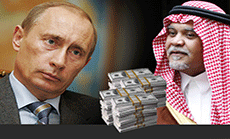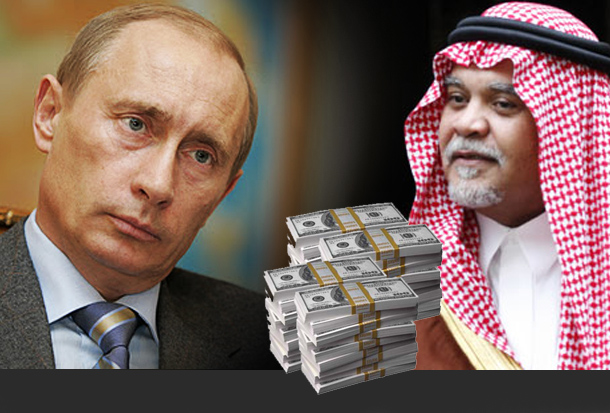Will Bandar’s Visit to Moscow Cease or Nurture Fights in Syria?

Sami Kleib - As-safir
Just recently, KSA's Saoud Faisal accused Russia of "supporting genocide" in Syria. The Kingdom has already said and reiterated that Moscow would lose its interest in the Middle East if it continued upholding President Bashar Assad. But Russian President Vladimir Putin did continue its support for embattled Assad. This is what prompted Prince Bandar Bin Sultan, the Secretary General of the National Saudi Security Council and Intelligence Chief, to mend his pace to the Kremlin.
Apparently, it was the Saudi stance that had changed, not that of Russia. The photo distributed by the Kremlin depicts a smiling president as receiving a smiling prince who came to the capital of the "communist atheism," as named once by Riyadh. Prince Bandar did not put on his fanciest suit. He did not either wear a pair of blue jeans like he did shortly before the war on Iraq when he sat down with his best gal George W. Bush at the White House. In Russia, there is a more imposing prestige. The Tsar just doesn't yield grantedly to pressures or leverages.

Bandar is not an ordinary man today in KSA. He may not be ordinary at all in the future of the kingdom. Whoever reads "Inside the Kingdom," by Robert Lacey, realizes how the prince, who had spent 22 years working in diplomacy in the US, excels at entering closed rooms and concocting internal and foreign strategies. He knows well the headway of the major international changes and the rules of the game.
The prince, like some of the current leaders in KSA, places in crosshairs the aim of striking Hizbullah and downplaying Iran, not failing to lash out at both sides with the harshest words. If sapping the regime of Bashar Assad helps them realize what they seek, they shall spare no effort in making their goal come true.
What has changed thus far so that the Kingdom changes and sends prince Bandar to the state "supporting the genocide in Syria?"
Look at Iran.
Some states of the Gulf are seriously concerned a rapprochement between Tehran and Washington happens. Despite the pressures wielded by the Congress on US President Barack Obama to extend sanctions-and so they were-both parties are trading woos. Tehran decided to invite the Americans to attend the swearing-in ceremony of President Hasan Rowhani. It is also plausible that Rowhani and Obama meet on the sidelines of the UN next meeting; and resuming P5+1 talks are pending the formation of the new government, according to the State Secretary. Moreover, Rowhani's open speech is gleaning appetite in Washington, albeit "Israel" and the supportive lobby's pressures.
Look at the depth of the US and European stances. According to information, Obama has officially told the Russians there would be no high-quality armament for the [Syrian] opposition for the time being and wanted to give the political solution a real chance. US officials conveyed this to the Syrian Opposition Coalition. France and Britain announced the same stance. KSA became almost the sole going towards armament and militarization, especially that the change in Qatar insinuated a likely change in the Qatari mood as to the Syrian crisis. Thus, there are two possibilities only: to agree either with Iran or with Russia. Prince Bandar chose the less embarrassing, maybe temporarily.
Look at the international confusion about the Muslim Brotherhood. KSA is now leading the Gulf campaign against Egypt's MB. This is how it practically killed the entire Qatari strategy which was built upon the shoulders of the so-called Arab Spring. So it was normal that the Kingdom encouraged democratic, liberal, communist, and tribal parties to share the Brotherhood grip and to curb their control inside the Coalition. Riyadh, which ruling is built on Sharia and Wahhabist influence, opposes to receiving one of the former "atheists" oppositionist Michel Kilo, who had paved the way for this relation months ago with his rabid war on the Brotherhood, then on the left, then on the idea of the civil state (review his articles in Assharq al-Awsat). Some have even wondered if Kilo was still an oppositionist!
Look at KSA relation with Turkey. It is hard to think of a sound relation between both sides, after the divergence reached its climax in Egypt. Turkey's Recep Tayyep Erdogan sees what is happening in Egypt as a coup, while KSA supported the coup. Wasn't the Kingdom which talked Salafists into supporting the army?
Look at the military situation in Syria. The map today shows that Syria is divided to three parts: one stretching along the coastline including Homs, Hama, Edlib, Tartous, and Latakia until Bekaa in Lebanon; this part is controlled by the regime, in addition to Damascus and the major part of its countryside, while most of the regions contiguous to Turkey, Iraq, and Jordan are within the grip of gunmen or Kurds.
Except for Khan Assal, which has dealt the Syrian army a blow, the rest of the regions are witnessing a remarkable advance. Information say that the Syrian authority is still carrying on its battle and is expecting major military changes in the next stage, whereby there is possibility that by next year, all key cities and strategic areas including Aleppo would be under the control of the regime.
Look at what is happening in Egypt. Is it normal that EU's Catherine Ashton is the one entitled to mediation? Why have the Americans retreated from Egypt and left the Europeans baffled in Egypt's tiff? Is it to burn Europe's role, or because Obama is obfuscated by Egypt's unrest and seeks patience?
Look at what the US is doing with respect to the Palestinian-"Israeli" settlement. Obama wants to score an achievement. Tunnels between Egypt and Gaza were destroyed. Hamas's siege was enhanced. The EU decided to put Hizbullah on the terrorism list. If Obama succeeds to push Palestinians and "Israelis" to start negotiating, this will be per se important to the US president now. This will be an expression of the US failure to make any encroach in Syria or Egypt, or even just an expression of a big distress.
Within this frame, Assad's fresh visit to Daraya carried many messages. This is a wide region that has witnessed the fiercest battles. The visit means that the army has made substantial achievements away from the limelight. Information say that the army is doing the same in other regions and that surprises will happen before the end of the summer.
It is then normal that the KSA looks for exits. The military one is relatively a priority. Prince Bandar has been to many western countries, in an attempt to lure them into arming the opposition. He tried to reassure his western interlocutors that the restructuring of the FSA was underway and that the opposition leadership was precluding weapons to reach hardliners. Western reports however say the exact opposite. The prince did not get what he wanted in terms of arming. For instance, France did not accept to hand the opposition Mistral missiles. KSA still hopes to change the military equation. Americans and Europeans are telling the Kingdom that if it succeeds, they will welcome the success but they will not bear the reverberations of the failure. Even though the military plans did not fall, there must be other options: KSA may talk Moscow into a deal. It seems that Putin is stiffer than the Saudi hopes. He has succinctly said that there could not be any solution if weapons influx continued. He has also broached the Saudi support for Chechens, warned of the danger of terrorism which is spreading everywhere, explained that Moscow would not accept any foreign military intervention and clarified that the US has become closer to the Russia in terms of the sought solution. But he maintained that there was still a long way ahead.
KSA has certainly to pressure the opposition to facilitate the holding of Geneva II talks.
It is crucial that Putin receives Prince Bandar. Moscow has endeavored to make Bandar understand that Russia's doors were open to deals and settlements, yet not at any price. There is no way for Assad's departure unless the Syrian people decides so. This entails negotiations then an interim government then elections.
Information fall short on indicating any flexibility in the Russian stance. Damascus is relieved. All what has been said was that Prince Bandar was trying to learn the real Russian opine not just about Syrian but rather about Iran and Hizbullah and all what KSA considers, before the US, the big demon; undoubtedly, Egypt and Palestine make the headlines in such meetings.
The meeting is equally advantageous to KSA and Russia. Prince Bandar can wave the Russian chip to the Americans and Putin can say that all cards may be in his hands.
What is risky is that such important meetings generally take place before major developments happen. Head of the Syrian Coalition, Ahmad Jarba, and other oppositionists and gunmen did not fear that Geneva II would not be taking place before a change in the balance of power. This is what he said from Doha, two days after they confirmed they would go to Geneva talks without conditions. Preparations for waging battles like Khan Assal are underway. The Assad-led Syrian authority, for its part, realizes that going to Geneva before a major encroach in north Syria or Deir el-Zor is insignificant. In conclusion, fights are to last for a long time.
Comments




